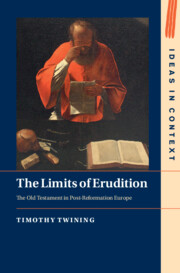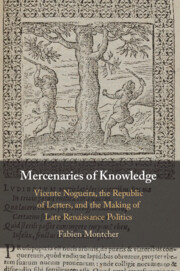Refine search
Actions for selected content:
16 results
Everyday Erudition: John Locke, the Bible and the Challenge of Early Modern Biblical Scholarship
-
- Journal:
- Transactions of the Royal Historical Society , First View
- Published online by Cambridge University Press:
- 11 September 2025, pp. 1-25
-
- Article
-
- You have access
- Open access
- HTML
- Export citation
Chapter 10 - European Literature, Dante to Rousseau
- from Part II - Intellectual, Cultural, and Political Contexts
-
-
- Book:
- Percy Shelley in Context
- Published online:
- 17 April 2025
- Print publication:
- 24 April 2025, pp 74-81
-
- Chapter
- Export citation
7 - Science as a Sphere of Autonomy
- from Part II - Autonomy and Teleocracy
-
- Book:
- Remaking the World
- Published online:
- 29 November 2024
- Print publication:
- 19 December 2024, pp 130-159
-
- Chapter
- Export citation
Introduction
-
- Book:
- The Limits of Erudition
- Published online:
- 05 December 2024
- Print publication:
- 12 December 2024, pp 1-23
-
- Chapter
- Export citation
Chapter 3 - Biblical Criticism and Mutual Censorship in the Confessional Republic of Letters
-
- Book:
- The Limits of Erudition
- Published online:
- 05 December 2024
- Print publication:
- 12 December 2024, pp 98-136
-
- Chapter
- Export citation

The Limits of Erudition
- The Old Testament in Post-Reformation Europe
-
- Published online:
- 05 December 2024
- Print publication:
- 12 December 2024
2 - The Mercenary Republic
- from Part I - Growing Up under the Pax Hispanica
-
- Book:
- Mercenaries of Knowledge
- Published online:
- 14 September 2023
- Print publication:
- 28 September 2023, pp 62-96
-
- Chapter
- Export citation

Mercenaries of Knowledge
- Vicente Nogueira, the Republic of Letters, and the Making of Late Renaissance Politics
-
- Published online:
- 14 September 2023
- Print publication:
- 28 September 2023
Chapter 2 - ‘Supporting Mutual Benevolence’
-
-
- Book:
- Institutions of Literature, 1700–1900
- Published online:
- 30 June 2022
- Print publication:
- 21 July 2022, pp 44-64
-
- Chapter
- Export citation
II - Prolegomena
- from Part II - Pierre Bayle and the Emancipation of Religion from Philosophy
-
- Book:
- The Kingdom of Darkness
- Published online:
- 23 March 2022
- Print publication:
- 31 March 2022, pp 227-250
-
- Chapter
- Export citation
Introduction
-
-
- Book:
- The Cambridge Companion to Eighteenth-Century Thought
- Published online:
- 15 June 2021
- Print publication:
- 20 May 2021, pp 1-13
-
- Chapter
- Export citation
6 - The Republic of Letters and the Origins of Scientific Knowledge Commons
- from Part II - Privacy as Governance of Participation and Boundaries
-
-
- Book:
- Governing Privacy in Knowledge Commons
- Published online:
- 29 March 2021
- Print publication:
- 25 March 2021, pp 151-184
-
- Chapter
-
- You have access
- Open access
- HTML
- Export citation
The Medieval Islamic Republic of Letters as World Model
-
- Journal:
- Cambridge Journal of Postcolonial Literary Inquiry / Volume 2 / Issue 2 / September 2015
- Published online by Cambridge University Press:
- 03 August 2015, pp. 281-286
-
- Article
- Export citation
Polysystems Redux: The Unfinished Business of World Literature
-
- Journal:
- Cambridge Journal of Postcolonial Literary Inquiry / Volume 2 / Issue 2 / September 2015
- Published online by Cambridge University Press:
- 03 August 2015, pp. 272-281
-
- Article
- Export citation
The Republic of Letters: Arab Modernity? [Pt. I]
-
- Journal:
- Cambridge Journal of Postcolonial Literary Inquiry / Volume 1 / Issue 2 / September 2014
- Published online by Cambridge University Press:
- 27 June 2014, pp. 265-280
-
- Article
- Export citation
6 - Edinburgh and Lowland Scotland
- from Part II - Geographies: The Scenes of Literary Life
-
-
- Book:
- The Cambridge History of English Romantic Literature
- Published online:
- 28 May 2009
- Print publication:
- 05 March 2009, pp 159-181
-
- Chapter
- Export citation
